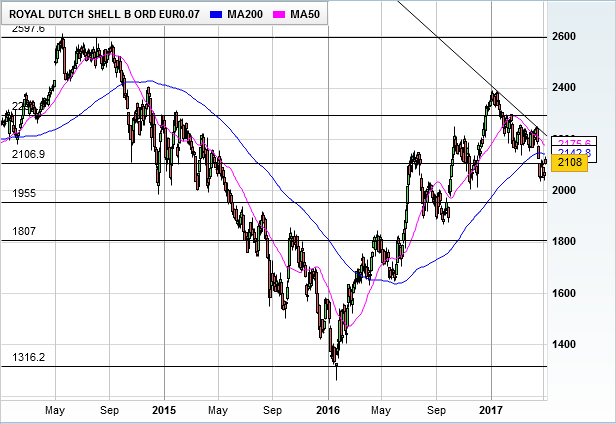City back in love with Shell after profits beat
4th May 2017 13:58
by David Brenchley from interactive investor
Share on
An expectations-busting week for oil companies continued Thursday as smashed analyst forecasts thanks largely to a sharp rise in oil prices.
Taking a lead from rivals including fellow London-listed oil major and US peers and , the Anglo-Dutch big-hitter reported a big leap in profits for the first three months of 2017 and maintained its generous dividend.
First-quarter underlying profit on a current cost of supplies (CCS) basis rocketed 142% year-on-year to $3.75 billion. That's almost a quarter higher than consensus estimates of $3.05 billion. Post-tax operating profit of $4.21 billion was over £700 million ahead of forecasts, and CCS earnings attributable to shareholders rose more than fourfold.
Shell, now benefiting from last year's £35 billion acquisition of BG Group, received a major boost from higher oil prices, 57% higher this quarter than a year ago.
Profits at the upstream division - oil exploration - missed City targets, but downstream had a great quarter, making $2.49 billion - 29% above consensus - driven by the oil products and chemicals businesses.
In reaction, Shell's share price ticked up 3.6% Thursday to a high of 2,135p, though still over 10% off January's two-year high near £24. Crucially, for income investors, the quarterly dividend stays at $0.47 per share and, despite earnings per share at just $0.43, UBS analyst Jon Rigby still expects a $1.88 payout for the year, giving a prospective yield nudging 7%.

Boss Ben van Beurden called it a "strong" three months, as the company continues to reshape its portfolio. Shell made $20 billion worth of divestments, including UK North Sea oil assets as well as ventures in Saudi Arabia, Canada and New Zealand.
Cash flow from operating activities was $9.5 billion, 9% higher than UBS's estimates. A working capital build of $1.83 billion implies an underlying operating cash flow of a "mighty" $11.3 billion, according to the broker.
This year, Shell will invest around $25 billion and deliver a number of new projects, van Beurden said, which he expects to generate $10 billion in cash flow from operating activities by 2018.
Barclays analyst Lydia Rainforth, a long-time Shell fan, says the numbers have "positive implications" for the stock and, given debt is running high due to its early 2016 acquisition of BG Group, the yield on Shell's cashflow is a more important metric for the firm than earnings.
Having outperformed expectations on cashflow, and with sale proceeds due in coming quarters, "it seems clear that Shell has reached the critical path of seeing gearing fall and is supportive for the shares," Rainforth added.
Both Rainforth and UBS's Rigby have the stock priced higher, with the former more bullish at 2,750p, implying potential upside of 30%.
Rigby, meanwhile, sticks with his £25 target, which has Shell trading at a multiple of 7.0 times enterprise value/debt-adjusted cashflow (based on $60 oil), a 15% premium to its three-year average, "with the increase reflecting improved capital productivity".
On that valuation, the stock also trades at a modest premium to peers BP (6.75 times) and (6.4 times), "reflecting the portfolio opportunity".
Van Beurden plans on creating a "world-class investment case" for Shell. A big chunk of that case rests on the fortunes of the oil price, as shown by the renewed vigour in oil majors' results. That oil price has slipped by around 10% in the past three weeks to around $50 a barrel.
Opinion is split in the City on oil prices, with Stephen Jones, chief investment officer at Kames Capital, expecting the price to stay "lower for longer". On the flip side, Bill McQuaker, multi-asset portfolio manager at Fidelity, sees "a more encouraging picture for oil".This article is for information and discussion purposes only and does not form a recommendation to invest or otherwise. The value of an investment may fall. The investments referred to in this article may not be suitable for all investors, and if in doubt, an investor should seek advice from a qualified investment adviser.